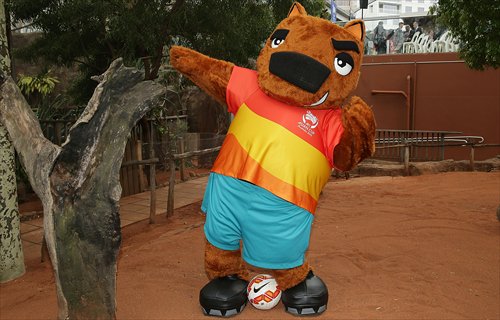HOME >> SPORTS
From the sidelines in Australia to the Asian Cup
Source:AFP Published: 2015-1-9 5:03:03
Football takes root down under

The 2015 Asian Cup's official mascot Nutmeg the wombat poses at Wild Life Sydney Zoo on November 11 in Sydney. Photo: CFP
Football was once sneered at in Australia as a game played mainly by immigrants but it cemented its rise from a minority sport to an established pastime when the Asian Cup started this week.In times past, lovers of football could find themselves insulted and attacked in a country where the rugby codes, Australian rules and cricket dominate the sporting landscape.
But international successes and a vastly improved domestic scene have been behind football's steady ascent in Australia, capped with the 16-nation Asian Cup starting on Friday.
Soccer is now more readily associated with standout moments like Tim Cahill's sublime strike at last year's World Cup, or Western Sydney Wanderers winning the 2014 Asian Champions League.
Sheilas, wogs and poofters
Traditional attitudes to football are summed up by the title of influential ex-player and broadcaster Johnny Warren's 2002 book Sheilas, Wogs and Poofters.
"Wogs" is a racial insult applied to immigrants, mainly from southern European countries like Greece, who arrived in waves in the years following World War II.
"'Sheilas,' 'wogs' and 'poofters' were considered the second-class citizens of the day and if you played soccer, you were considered one of them," explained Warren, who died in 2004.
"That's how soccer was regarded back then and, to some extent, still is today."
Debate remains lively over whether the sport should retain its formerly preferred name of "soccer," to avoid clashing with rugby league and Australian rules, both proudly known as "football."
Soccer in fact has deep roots in Australia, with reports of games as far back as the 1830s, and the first match played under the official Laws of the Game taking place in Sydney in 1880.
But rugby was then the game of choice in colonial power Britain, a preference which helped push football in Australia to the margins, despite its early successes.
So while football flourished across the globe, there was little being played in Australia until the post-war migrants arrived from Europe and took root in the country.
"When I was at primary school in the 1970s, kids like myself - who decided to kick a soccer ball around their streets and in the schoolyard - were ridiculed, mocked and beaten up," wrote Nick Giannopoulos, star of Australia's Wog Boy comedies, in 2006.
"Not a week would go by when some kid would come up to us and tell us that if we were Aussies then we should be playing footy and not that 'wogball.'"
Improving Socceroos
Despite ambivalence toward the game, Australia reached their first World Cup in 1974, exiting at the group stage, but they would have to wait 32 years before making a triumphant return in 2006.
Goals from Cahill, John Aloisi, Craig Moore and Harry Kewell took the Socceroos into the quarterfinals in Germany, where they were undone by a controversial last-gasp penalty against eventual winners Italy.
Despite the cruel defeat, it was a campaign that ignited football interest in Australia, also spurred on by the resurrection of the domestic game by Football Federation Australia (FFA).
The newly formed FFA, chaired by Westfield shopping center billionaire Frank Lowy, created the franchise-based A-League in 2005, a competition which has featured Alessandro del Piero, David Villa and Robbie Fowler, among others.
Australia also cannily switched from Oceania to Asian Football Confederation recognition in 2006, easing their World Cup qualification route and gaining access to the Asian Champions League.
While kissing goodbye to routs like their world-record 31-0 victory over American Samoa in 2002, Australia reached both the 2010 and 2014 World Cups via Asian qualifying.
Western Sydney Wanderers became Australia's first winners of the Champions League when, just two years after their formation, they stunned Asia's best teams to win the club tournament on debut.
The Asian Cup comes after Australia's failed bid to hold the 2018 World Cup, at a 2010 vote where Russia and Qatar were selected as 2018 and 2022 hosts - and which has since been the subject of a corruption probe.
Now the goal is a first major trophy for the Socceroos, who came desperately close at the 2011 Asian Cup when they lost the final 1-0 to Japan after extra time.
Their squad, led by Greek-born coach Ange Postecoglou, features a broad mix of Anglo-Saxon, Celtic and European names, reflecting the diversity of modern Australia - a far cry from the days of "wogball."
Posted in: Feature